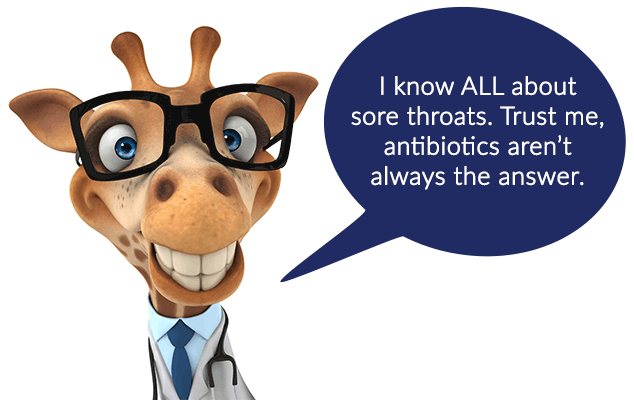
Taking antibiotics for a viral infection won’t cure your sore throat, keep others from catching it, or help you feel better. In these cases, antibiotics can actually do more harm than good.
Whether or not antibiotics will help your sore throat depends on what kind of sore throat you have.
Cold and flu: Most commonly a sore throat is one of the first signs of a cold, the flu, or other viral illness. If your child develops other symptoms like a cough, hoarseness, red eyes, and runny nose, it is probably just a viral infection. Antibiotics don’t help with viral infections and can actually make it harder for your body to heal. Only time, rest, and your body’s natural defenses can cure a viral infection. Learn more about simple ways to relieve symptoms at home.
Strep Pharyngitis: About 20% of persistent sore throats are caused by the bacteria Group A Strep. Since this is a bacterial infection, antibiotics can help and you will want to seek treatment. Call your doctor if your child’s sore throat lasts longer than five days and continues to get worse or the fever lasts longer than three days. Symptoms of strep throat also include fever, rash, headache, sore glands, red and white patches in the throat, swollen tonsils, abdominal pain, nausea, and loss of appetite. Learn more about strep throat.
Infectious mononucleosis (Mono): Mono is caused by the Epstein-Barr virus (EBV), which is a type of herpes virus. Because it is viral, antibiotics won’t help with mono. It can be hard to distinguish mono from the flu because they share many of the same symptoms, but if your child’s symptoms last more than a couple of weeks and don’t get better after lots of rest, see your pediatrician. He or she will be able to diagnose mono through a physical exam and possibly a blood test. Learn more about mono and its symptoms.
Post-nasal drip: Post-nasal drip is like a runny nose, but instead of the mucus coming out the front of your nose, it runs down the back of your throat. The constant dripping can cause irritation, resulting in a cough or a sore throat. Post-nasal drip is commonly caused by allergies and sinus infections. Most sinus infections are viral and an antibiotic would only be helpful if your sinus infection was caused by bacteria. If you think your post-nasal drip is caused by allergies, your pediatrician can test for allergies and suggest appropriate treatments. Learn more about treating seasonal allergies.
Peritonsillar abscess: This is when an infection of the tonsil spreads to the surrounding tissue and forms an abscess or pocket of pus. The pain is usually one-sided and symptoms include a fever, trouble swallowing, and difficulty opening the mouth. If you think you have an abscess, you will want to see a doctor right away.
Call your doctor if you have:
If you are having trouble breathing or swallowing, can’t open your mouth all the way, are dehydrated, have a stiff neck, or have blood-colored spots on your skin, you should go to the emergency room right away.
For more information about antibiotics:
Bugs are scary. Superbugs are even scarier.
Using the right tool for the job: When antibiotics do and don’t work
What you should know about using antibiotics
Pneumococcal vaccine reduces serious superbug infections
Report Cautions Doctors About Prescribing Antibiotics for Children
